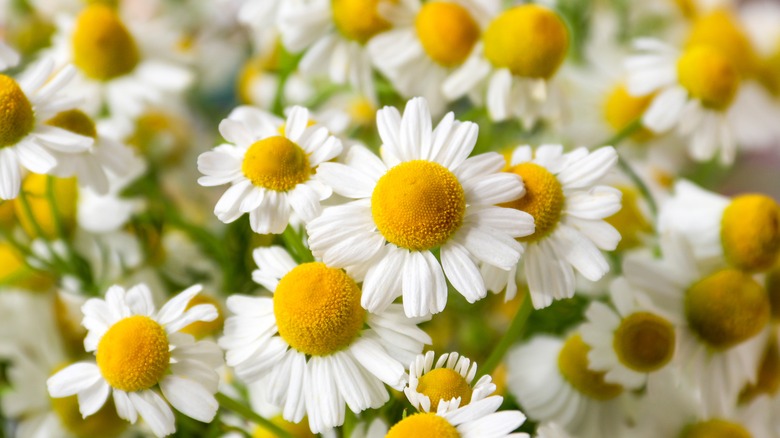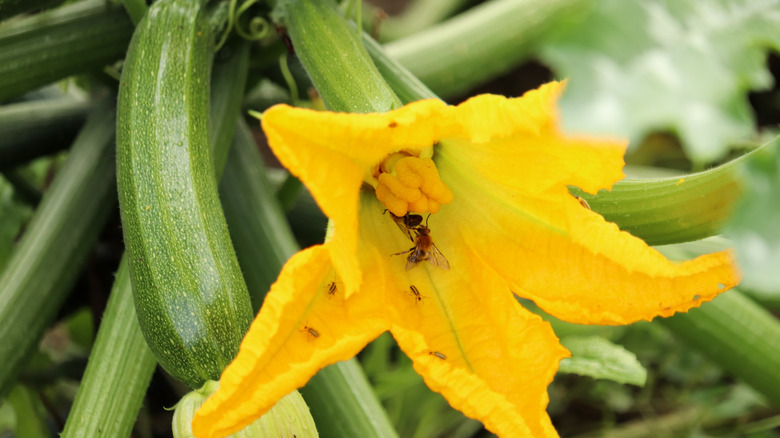The Benefits Of Growing Chamomile Near Zucchini In Your Garden
Tea lovers, flower aficionados, and companion planting gurus can all agree on one thing: it's a good idea to use chamomile in your garden to boost the yield and overall health of your zucchini plants. Gardeners have used companion planting techniques for millennia to strategically balance soil nutrients, keep pests at bay, and increase yield. Growing chamomile (Matricaria chamomilla) near zucchini (Cucurbita pepo) in the garden offers benefits, including attracting insects, protecting from fungal infection, and creating much-needed shade.
Chamomile is a flowering plant commonly used to create a popular herbal infusion, chamomile tea. As a member of the daisy family, chamomile provides lovely visual interest in the garden and offers important benefits to neighboring species. This flower grows best in full sun and well-drained soil and can grow up to 2 feet tall. Zucchini is a type of squash that comes in several varieties, some of which grow in a bushy shape while others form vines. A single plant generally yields large amounts of produce throughout summer and fall, and they are relatively easy to care for, making them popular in beginner gardens. Like chamomile, zucchini should be planted in full sun and moist soil.
Chamomile helps zucchini grow
Chamomile boosts the overall health of zucchini plants by releasing chemicals that encourage growth and improve flavor. Your zucchini plants will not only grow more quickly when the beautiful flowers grow alongside them but also provide a better yield. Gardeners even use chamomile tea as a fertilizer or repurpose the flowers and leaves as nutritious mulch.
On top of boosting growth, chamomile also has antifungal and antibacterial properties. This is especially impactful because powdery mildew is one of the most common diseases for zucchini plants. Powdery mildew is a fungal disease that thrives in warm, dry climates and often impacts zucchini crops later in the season. It can stall the growth of its host plant and decrease your yield due to premature ripening and sunburn, so preventing it is paramount in the vegetable garden. Careful pruning of dead leaves and avoiding overhead watering can help limit its spread, but planting an antifungal flowering companion plant such as chamomile can go a long way.
Chamomile attracts beneficial insects
Another reason chamomile is the lovely flower you'll want to grow with zucchini in your garden is that it helps attract beneficial insects that pollinate your squash and prey on pests that could harm your veggies. Chamomile attracts hoverflies, ladybugs, and parasitic wasps, which all prey on aphids. Aphids are small, pear-shaped insects that can damage zucchini plants by spreading diseases. Chamomile keeps these bugs away and gives your delicious squash crop a fighting chance.
In addition to keeping aphids away, ladybugs and parasitic wasps are also pollinators. Zucchini plants will not produce vegetables if their blossoms go unpollinated. While some gardeners perform this pollination process by hand, it's much less labor-intensive and often more effective to let pollinators do their work. Planting chamomile near your zucchini will draw these pollinators to the area and allow them to work their magic! As a bonus, planting these two sun-loving crops together means you'll enjoy a summer full of delicious squash and relaxing chamomile tea.



